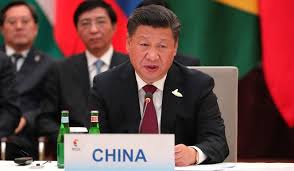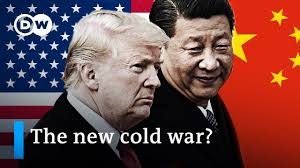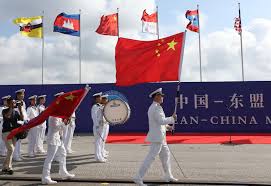
China will not involve itself in a so-called new Cold War
By Hu Xijin
The China-US relationship is being described as going through a free fall. The phrase “a new cold war” has been appearing increasingly in analyses by media outlets and observers worldwide.

But China will not fight a new cold war with the US. A cold war requires a comprehensive mobilization of both Chinese and American societies and the involvement of most parts of the world. It is not something that could be determined unilaterally by a group of US policymakers or a handful of US elites. Bringing the entire mankind back into the Cold War is a crime that history will never forgive. Washington will be confronted with a lot of resistance at home and from abroad if it wants to do so.
Today’s world is completely different than that of the Cold War era, during which the camps of socialism and capitalism were formed. The Soviet Union was trying to spread its ideology across the world and the West felt it had its daggers drawn with Soviet-style socialism. The two camps had little interaction – if any – between one another. The political cohesion brought by the Cold War for both sides far outweighed the price they paid for confrontation during the time. Today’s world is highly integrated, and it is not shaped by politics, but is a result of technological progress and continuous expansion of the market economy. Unless there is a life-and-death emergency, no power could completely split the world by politics or ideology.

If the US no longer sells its chips to China, to whom will it sell them? For the moment, over half of US-made chips are sold to China. If the US stops selling agricultural products to China, a large quantity of land in the US will be wasted. About 40 percent of General Motors’ sales are made in China. If the company quits the Chinese market, it will no longer be a competitive global enterprise.
China has been the largest market for European companies including Mercedes-Benz, BMW and Audi. Substantial quantities of interests made by European luxury brands come from China. Quite a few classic, beautiful yet sluggish towns in Europe have been revitalized by Chinese tourists. Europeans do not like China’s ideology, but interactions with China do not get in their way of being themselves. On the contrary, decoupling with China would make them feel insecure.
For the sake of national security, and to prevent being invaded by the so-called devil from the East, they could resolutely unite themselves to fight a new cold war against China. The question is, is China really a devil? Is the China-West relationship really a “life and death” struggle as Washington says? The US so far cannot present any evidence to prove its claims that China is spying on the whole world through Huawei-sourced equipment. But the US’ PRISM spying program revealed that the US had been spying on German Chancellor Angela Merkel. That is real solid proof.
The US has accused that China is expanding militarily and is invading other countries. Yet what it has been talking about is merely territorial and maritime disputes. Not a single shot has been fired by China in over 30 years.
The US said that China has influenced Hollywood because the latter modified some less important plots in certain films in order to sell them to China. It also claimed that learning materials that criticize China are not allowed to be used in Confucius institutes. This was taken as proof of a so-called Chinese attempt to alter US ideology. However, it’s easy to find that these are in fact efforts made by China to win respect from the US in its interactions with the US. No attempt to alter US domestic rules is involved at all.
The Trump administration has fabricated a scene in which the Western world is “threatened” by the “Chinese dictatorship.” The US and many in the Western world have different views. It is difficult for the current US administration and political elites who support it to launch a new cold war via such false information and sheer lies.
Washington has spared no efforts in mobilizing Western countries to abandon Huawei equipment. It hopes to make General Motors, McDonald’s, Apple, VISA and Nike all move out of China and it asks US universities to expel Chinese students. Are all of these feasible? Will companies of Germany, Japan and South Korea follow the US lead if they are demanded to withdraw from China?
That being said, refusing to fight the so-called new cold war is far more operable and promising than engaging in a new cold war. But will China restrain its anger and remain silent in the face of US provocations? Of course not. If the US breaches China’s bottom lines, then China will not be afraid of fighting a cold war, or even a hot war, with the US. Washington and the Tsai Ing-wen authorities on the island of Taiwan know this well. The world has seen how China resolutely struck back when its bottom line was challenged in the past.
Chinese civilization has withstood hardships and is resilient. This has shaped our firm will and endowed us with sufficient rationality and wisdom. Today’s China cannot be a coward, nor act impulsively. It should carry out unprecedented geopolitical strategic maneuvers with the US.

China is a country with strong cohesion and enormous development potential. It has many friends worldwide, who support Beijing over issues such as the Xinjiang question and Hong Kong affairs. This has laid a solid foundation for China’s strategic maneuver with the US.
China is fully capable of continuing its own agenda under heavy US pressure. It should keep opening up to the outside world. The more the US wants a cold war, the more opening-up China should undergo. Only in this way can China shape an unprecedented strategic quagmire for the US. The US will be dragged down. It will be unable to form a determination to launch a showdown with China at any cost. Nor will it organize a united Western front against China. A so-called new cold war will only consume US strength.
(The writer is the editor-in-chief of the Global Times)